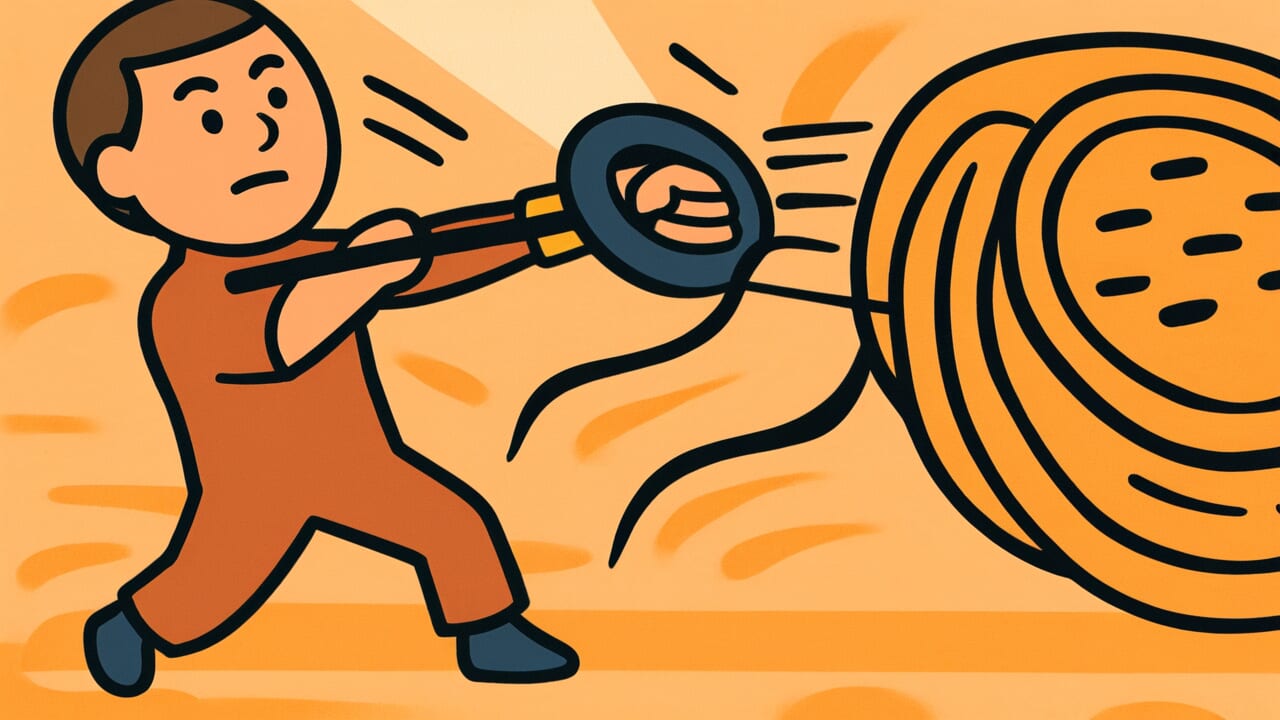How to Read “When misfortune strikes, it strikes even through straw clothing”
Ataru bachi wa komo kitemo ataru
Meaning of “When misfortune strikes, it strikes even through straw clothing”
This proverb means that people destined to face disaster cannot avoid it, no matter how careful they are.
Even if you wear komo, a crude protective garment, to shield yourself, the misfortune that is meant to come will still arrive. It expresses the unavoidable nature of fate.
People use this saying when explaining situations where someone faces continuous bad luck, or when disasters strike despite all precautions.
For example, you might say, “He’s like ‘When misfortune strikes, it strikes even through straw clothing’—nothing goes right for him no matter what he does.” It points out someone’s seemingly fated bad luck.
In modern times, we emphasize the importance of effort and preparation. But this proverb acknowledges the opposite—that fate exists beyond human control.
However, it doesn’t encourage giving up. Rather, it offers a kind of emotional relief. When facing unavoidable disaster, you don’t need to blame yourself excessively or worry too much.
Origin and Etymology
No clear written records document the origin of this proverb. However, we can make interesting observations from its components.
“Komo” refers to a crude mat woven from straw. During the Edo period, poor people sometimes wrapped themselves in komo for warmth.
Wearing komo represents taking maximum defensive measures to avoid disaster.
“Ataru batsu” means divine punishment or calamity. “Ataru” means that disaster befalls you.
So this proverb likely means: “Even if you try to protect yourself with crude straw matting to avoid disaster, the misfortune destined for you will still come.”
Fatalistic thinking has existed in Japan since ancient times. Buddhist concepts of karma and Shinto ideas of “destiny” deeply influenced common people’s lives.
This proverb embodies an attitude of acknowledging and accepting the power of fate—forces beyond human control.
It likely emerged from the lived experiences of poor people. Despite its simplicity, it expresses a profound philosophy of life.
Usage Examples
- He’s like “When misfortune strikes, it strikes even through straw clothing”—he prepared carefully but failed again
- Getting into an accident despite being so careful—I guess it’s “When misfortune strikes, it strikes even through straw clothing”
Universal Wisdom
Behind this proverb lies a fundamental question humans have asked since ancient times. “Why do disasters strike even good people?” “Does effort always pay off?”
These questions have no clear answers.
We want to believe that effort brings rewards, that preparation prevents failure. Yet reality shows us that unexpected disasters can strike no matter how carefully we live.
When facing such unfairness, people feel deeply hurt. They blame themselves, despair at the world’s injustice.
This proverb may be a quiet comfort from our ancestors to such suffering. “It’s not your fault. Fate sometimes moves with power beyond human understanding.”
Acknowledging that some disasters cannot be avoided even with perfect preparation opens a path to freedom from excessive self-blame.
At the same time, this proverb teaches humility. We tend to think we can control our lives. But reality is filled with unpredictable elements.
Accepting this uncertainty can actually bring peace of mind. Not fearing fate, but respecting it with awe.
This short phrase contains such a philosophy of life.
When AI Hears This
In pure probability theory, even if you roll a die ten times and get all ones, the probability of getting one next remains one in six.
In other words, “chains of luck” don’t exist. Yet the human brain perceives three consecutive unlucky events as “I’m in an unlucky period right now.”
This is the reverse of the gambler’s fallacy, called the hot hand effect—a cognitive bias.
What’s interesting is that this bias itself changes reality. People who think “I’m just unlucky” unconsciously take defensive actions.
For example, they become passive about new opportunities or neglect preparation. This actually increases their probability of failure.
Statisticians call this a “self-fulfilling prophecy.” The prophecy realizes itself through its own existence.
There’s an even deeper problem. Humans have “negativity bias”—we remember failures better than successes.
Even when success and failure are actually equal, failures leave stronger impressions. So we mistakenly believe “I’ve always been unlucky.”
One study found that people with an objective success rate of 60 percent subjectively feel it’s only about 40 percent.
This proverb is probabilistically incorrect. Yet through human cognitive systems and behavioral patterns, it “becomes true.”
It succinctly expresses the self-fulfilling mechanism of prophecy.
Lessons for Today
This proverb teaches modern people liberation from perfectionism. Contemporary society emphasizes “personal responsibility.”
The dominant value is that all results depend on your own effort. But this sometimes crushes us with excessive pressure.
No matter how much you prepare or how careful you are, unavoidable bad luck exists. Acknowledging this doesn’t mean laziness or giving up.
Rather, it’s the wisdom to distinguish what you can control from what you cannot.
What matters is not blaming yourself too much when disaster strikes. Don’t get trapped in regrets like “If only I’d prepared more” or “If only I’d been more careful.”
Have the courage to accept “This was unavoidable.” Doing so generates energy to look forward and take the next step.
You also become kinder toward others’ misfortunes. When someone faces disaster, you can offer sympathy saying “That’s bad luck” instead of dismissing them with “It’s your own fault.”
People who know that life has walls effort alone cannot overcome become truly strong. And truly kind.



Comments